Eccentrics
Winter Zero’s Musical Bottle Farm
From the 1930s to the 1950s, one of the most popular oddities to visit in Ohio was Winter Zero Swartsel's "Bottle Farm" located outside of Farmersville. (He said he got his name because he was born on a "hard, cold winter day.") Here's a description of it from the historical marker now at the site:Curious that there were no visitors from Delaware.


Here's another description of the Bottle Farm from "Joe" on Angelfire:
Scattered across the fields were heavy wooden structures that supported old church bells. To each bell's clapper was loosely wired an irregularly cut piece of tin painted flat black. Each piece of tin had some Indian words or a short phrase or saying scrawled across it in white paint. Whenever the wind blew, the pieces of tin would dance in the breeze and cause the clappers to clang the bells.
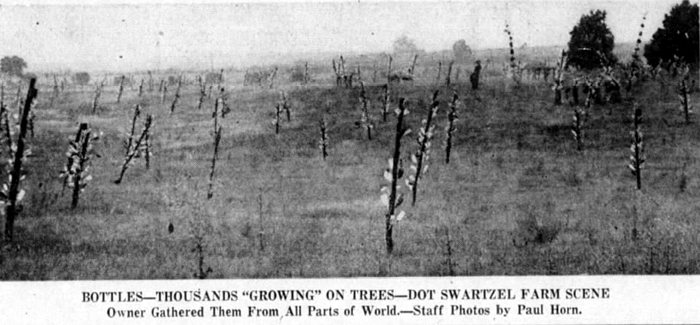
Dayton Daily News - Aug 18, 1954

Pittsburgh Press - Jun 12, 1938
News reports indicate that Swartsel wasn't on the best of terms with the surrounding community. He had a habit of shooting at teenagers whom, he claimed, were trespassing on his property.
When he died in 1953 the city tried to preserve the Bottle Farm as a tourist attraction but gave up after two years and auctioned everything off. Today the historical marker is the only reminder of the Farm's existence at the location.
Posted By: Alex - Mon Nov 22, 2021 -
Comments (2)
Category: Eccentrics, Outsider Art
C. W. Leadbeater, Theosophist
Anyone with even a passing interest in the weird has heard of that famous eccentric Madame Blavatsky and the Theosophical Society.But less attention is paid to her interesting comrade, C. W. Leadbeater.
Read his pretty short book THE LIFE AFTER DEATH here.
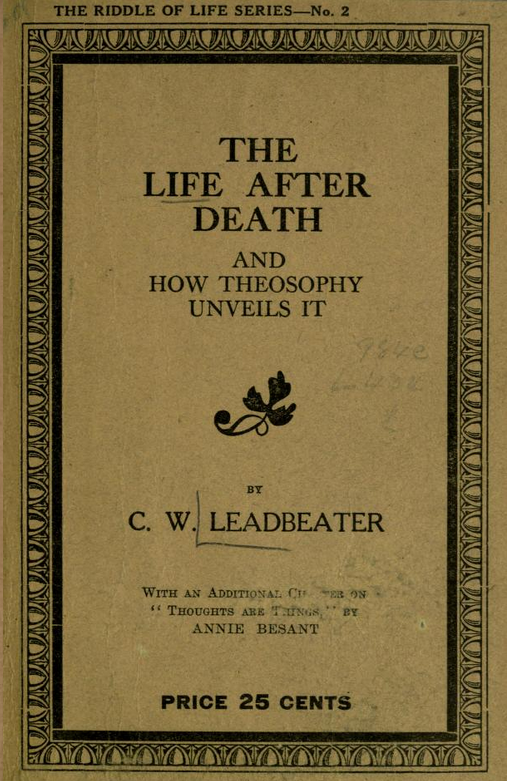
Posted By: Paul - Wed Nov 17, 2021 -
Comments (2)
Category: Death, Eccentrics, Supernatural, Occult, Paranormal, Books, Nineteenth Century, Twentieth Century
The Valley of the Dawn
Read a recent article on the sect here.
The Wikipedia page.

Posted By: Paul - Tue Nov 16, 2021 -
Comments (1)
Category: Aliens, Eccentrics, Religion, Space Travel, South America
The Dryer Lint Art of Heidi Hooper
Recent article here.
More videos at her YouTube channel.
Posted By: Paul - Sat Oct 23, 2021 -
Comments (2)
Category: Domestic, Eccentrics, Outsider Art
High Spirits
A unique defense.Source: Daily News (New York, New York) 08 Mar 1943, Mon Page 219
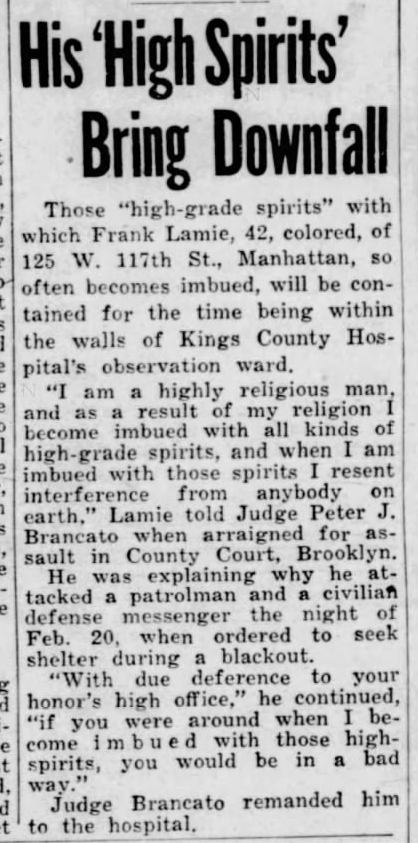
Posted By: Paul - Sun Oct 17, 2021 -
Comments (0)
Category: Eccentrics, Police and Other Law Enforcement, Religion, Mental Health and Insanity
Crook, the Unkissed
Algie R. Crook (or "Alja" Crook, as his name was sometimes spelled) was a professor of mineralogy at Chicago's Northwestern University. His great claim to fame, however, had nothing to do with science. Instead, it was that in April, 1901 he allegedly told his undergraduate class that he had never kissed a woman. More specifically, he reportedly said, "I have never uttered a profane word, never have smoked or chewed tobacco, drank intoxicants, nor hugged or kissed a woman."Given that he was thirty-seven years old at the time, this was considered a remarkable admission. So remarkable that when word of it leaked to the press it became international news.

Great Falls Tribune - May 15, 1901
The media started referring to him as "Crook, The Unkissed." Acquaintances of Crook (or people who claimed to be his acquaintances) readily confirmed the tale, attributing his lack of kisses to his embrace of "austere science." One said, "the scientific atmosphere is inimical to the love germ."
Offers of marriage flooded in, from women hoping to be the one to thaw the professor's icy reserve.

Philadelphia Times - Apr 28, 1901
The French were particularly taken with the story. As reported in the Leavenworth Times (May 8, 1901):
Supposedly the news even reached as far as China where the dowager empress expressed a desire to see him.

Philadelphia Inquirer - Apr 27, 1901
Crook, for his part, was said to be "abashed and humiliated over the gossip the affair has provoked," and also furious at the "tattling undergraduates."
He issued a denial of the allegation, stating, "I have never told any one that I have refrained from hugging or kissing women, for the reason that I consider it nobody's business but my own."
He recalled having advised a student to do as he did — never to kiss, hug, swear, and so forth. And he figured that's how the story must have started. But he insisted that he hadn't said that he had never done these things at all.
However, it was too late. The story was out there and couldn't be taken back. His denial got buried in the back pages of newspapers, if it was printed at all.
In other interviews, Crook asserted that he had kissed female family members, which didn't help his case much since it implied that he had indeed never romantically kissed a woman. Also, a former student recalled that Crook had made similar claims before, noting, "He is a consistent Methodist, and his convictions sometimes cause him some trouble." So I kind of suspect that Crook really did make the no-kissing claim to his class, but denied it later out of embarrassment.
Whatever the case may have been, the tale continued to haunt him. The following year (1902) a group of students at Northwestern formed an "Anti-osculation Society," claiming that they were "following the teachings of Professor Algie R. Crook, the man who never was kissed." They elected him an honorary member.
In 1904 Crook got married, and inevitably this triggered a renewal of the no-kissing story. "Unkissed Man To Wed," reported the papers.

The Hutchinson News - Dec 28, 1904
Crook and his wife eventually had five children together. He died in 1930, at the age of sixty-six, and the kissing story resurfaced in his Chicago Tribune obituary (June 1, 1930). It was, after all, the achievement he was most famous for:
However, the memorial of him in the Journal of the Mineralogical Society of America omitted the kissing story. Nor is it mentioned on the wikipedia page about him.
Posted By: Alex - Fri Oct 08, 2021 -
Comments (6)
Category: Eccentrics, Science, 1900s, Love & Romance
Unauthorized Dwellings 19
Full story here.
Posted By: Paul - Sun Oct 03, 2021 -
Comments (1)
Category: Eccentrics, Oceans and Maritime Pursuits, Unauthorized Dwellings, Middle East
The Attack-Trained Iguanas of Irenee du Pont
Irénée du Pont was president of the Du Pont Company from 1919 to 1925, and remained on its board of directors until 1958.He built a mansion named Xanadu down in Cuba, where he trained iguanas to attack and kill on his command. Details from Du Pont Dynasty: Behind the Nylon Curtain by Gerard Colby:

"Irénée du Pont, 80, bends to pat an iguana on his Cuban estate where many of these lizards wander. He feeds them papaya from jar he holds"
Life - Aug 19, 1957
Posted By: Alex - Wed Sep 08, 2021 -
Comments (5)
Category: Animals, Eccentrics
The Odd Downfall of Mary Carolyn Davies
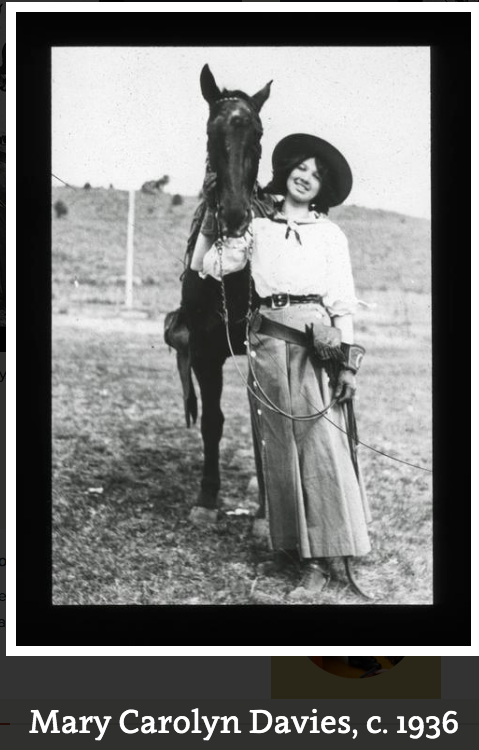
From pulp writer and poet to Skid Row: writing has never been an easy career.
Read the whole arc of her life here.
Read some of her fiction at the Internet Archive.
Newspaper clip from The News Journal (Wilmington, Delaware) 08 Feb 1940, Thu Page 20
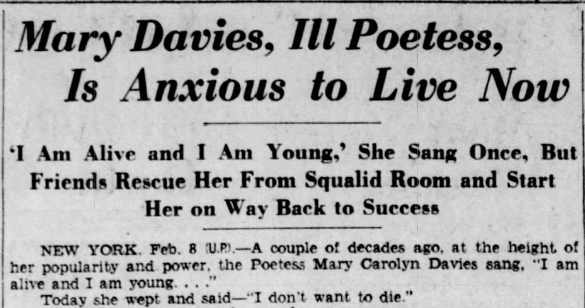
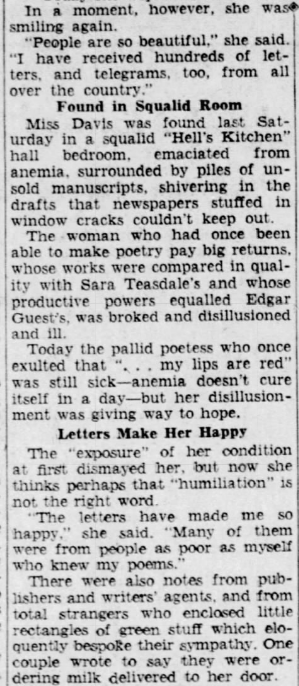
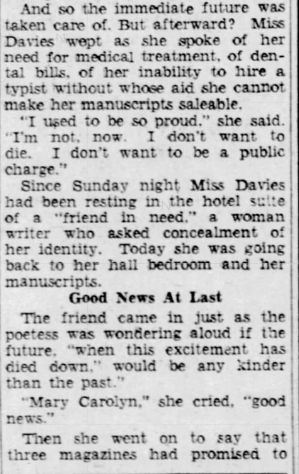
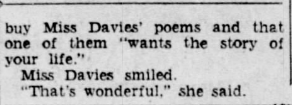
Posted By: Paul - Sun Aug 29, 2021 -
Comments (0)
Category: Eccentrics, Literature, Money, Twentieth Century
Carl Casper’s Phone Booth Car
Visit this page to see a modern version.
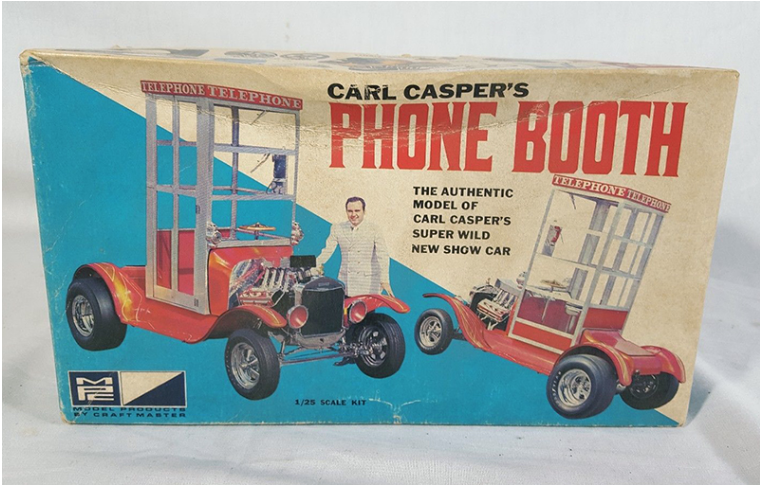
Posted By: Paul - Fri Aug 27, 2021 -
Comments (0)
Category: Eccentrics, Toys, 1960s, Cars

| Who We Are |
|---|
| Alex Boese Alex is the creator and curator of the Museum of Hoaxes. He's also the author of various weird, non-fiction, science-themed books such as Elephants on Acid and Psychedelic Apes. Paul Di Filippo Paul has been paid to put weird ideas into fictional form for over thirty years, in his career as a noted science fiction writer. He has recently begun blogging on many curious topics with three fellow writers at The Inferior 4+1. Contact Us |




